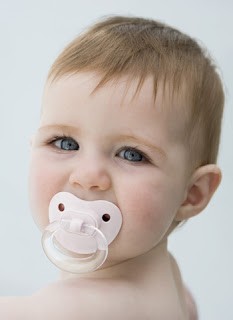The word "pacifier" means peacemaker and refers to an object that soothes and calms. That is precisely the objective of pacifier and to this end most parents begin to introduce the pacifier in the daily lives of babies. However, we can not ignore everything that we introduce artificial process to modify the behavior of the children has advantages and disadvantages, and for this reason it is necessary to know before deciding to use it.
In general, the baby's sucking need is strongest during the first months of life. Taking things to the mouth is the way for babies to learn and discover their world. With or without a pacifier, the baby will quickly discover that their own fingers and hands are good for suck. But, according to some medical studies, both pacifiers and fingers, especially thumbs, can cause problems dental malocclusion, Which occurs when the two dental arches, the top and bottom, do not fit properly when you bite.
In general, the baby's sucking need is strongest during the first months of life. Taking things to the mouth is the way for babies to learn and discover their world. With or without a pacifier, the baby will quickly discover that their own fingers and hands are good for suck. But, according to some medical studies, both pacifiers and fingers, especially thumbs, can cause problems dental malocclusion, Which occurs when the two dental arches, the top and bottom, do not fit properly when you bite.
Why the parents introduce the use of the pacifier?
There are several reasons. First, to regulate the hours of feeding and dream of children. During the first weeks of life, children breastfed have no schedule and eat more often, at short intervals of time or sleep a lot, and cry more at night than during the day. According to Dr. Elias Jimenez, Diagnostico.com not recommended pacifier use in infants under one month, because the risk of aspiration of vomit is higher in an infant with a pacifier than without it.
The second reason is to reduce the pain and tears produced by the colic. Parents use a pacifier to calm the baby, not knowing that the colic is closely related to gas production in the gut, and that the pacifier may enable the child to swallow more gas. It is shown that babies with colic do not improve with the use of pacifier.
The third reason is to prevent the child acquires the thumb sucking habit, Which is just a palliative because when we take away the pacifier, many children begin to use your finger.
Advantages and disadvantages of pacifier
The pacifier recommendations are very few and the many potential problems. For use, it is advisable to introduce it into the baby's life after one month of age, when the lactation is properly instituted. It should stop using it before 10 months And always use it for very short periods of time such as before mealtime, and obeying strict sanitation. In any case, instead of a pacifier can soothe baby with other methods such as sing, And rubbing or massaging her body.
The second reason is to reduce the pain and tears produced by the colic. Parents use a pacifier to calm the baby, not knowing that the colic is closely related to gas production in the gut, and that the pacifier may enable the child to swallow more gas. It is shown that babies with colic do not improve with the use of pacifier.
The third reason is to prevent the child acquires the thumb sucking habit, Which is just a palliative because when we take away the pacifier, many children begin to use your finger.
Advantages and disadvantages of pacifier
The pacifier recommendations are very few and the many potential problems. For use, it is advisable to introduce it into the baby's life after one month of age, when the lactation is properly instituted. It should stop using it before 10 months And always use it for very short periods of time such as before mealtime, and obeying strict sanitation. In any case, instead of a pacifier can soothe baby with other methods such as sing, And rubbing or massaging her body.
If this article was useful and you want to help us to grow Subscribing to our feed or Click "Like" in our Facebook page ,or follow us via Twitter or subscribing to our feed.














0 comments:
Post a Comment